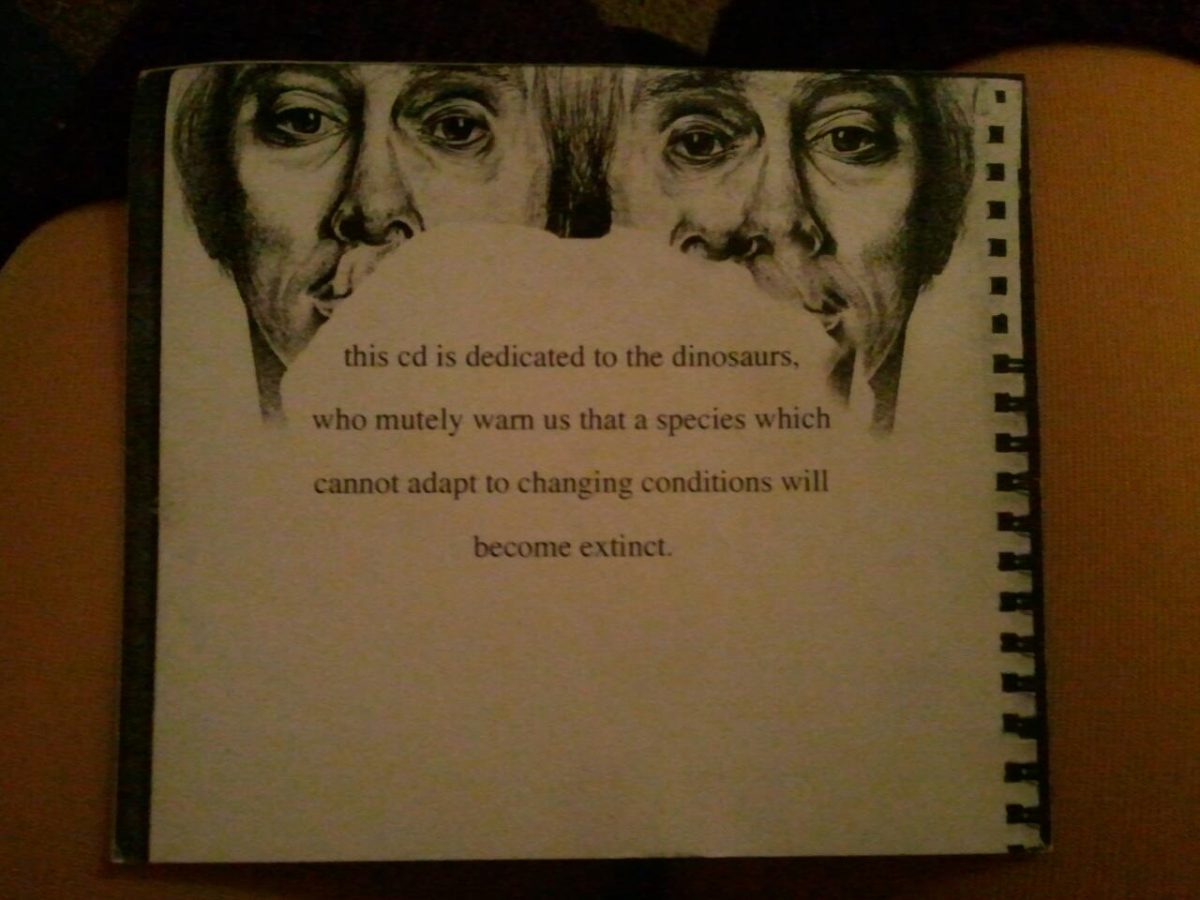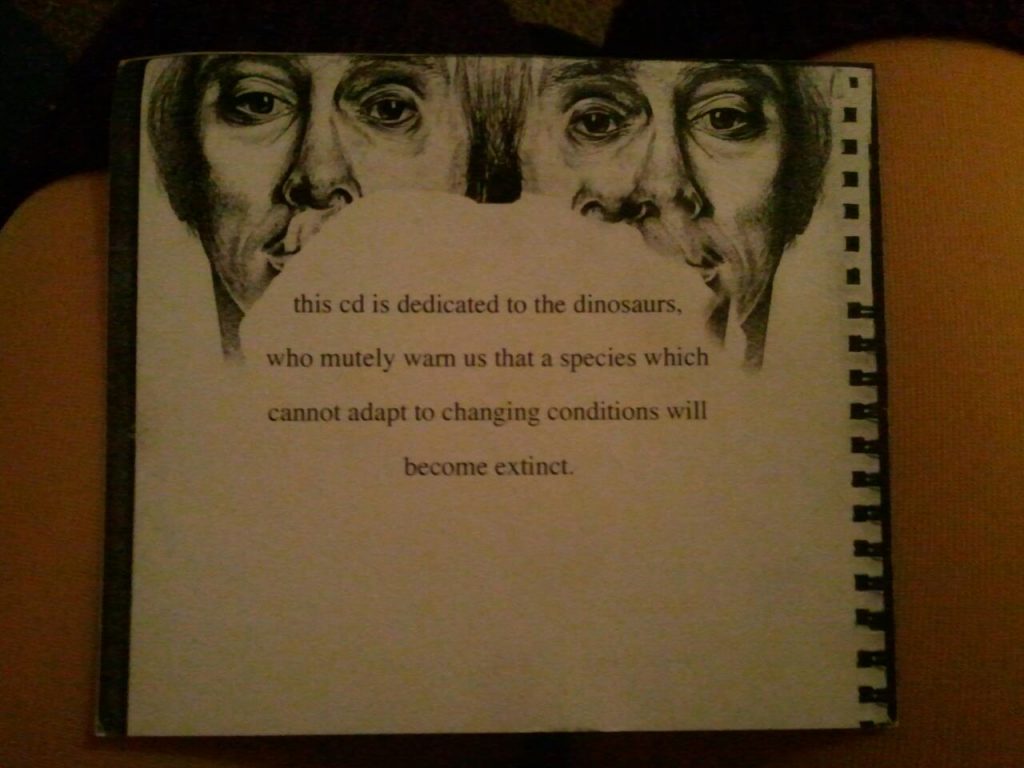
This CD is dedicated to the dinosaurs, who mutely warn us that a species which cannot adapt to changing conditions will become extinct.
Sometime in the early 2000s, a punk band in Spokane Washington released an EP in a kraft paper sleeve with an ominous quote printed on the back, framed by medical anomaly illustrations. Over the course of a decade, this sleeve traveled 358 miles, making its way to me in Portland, Or. One night, digging through my college boyfriend’s vast media collection, the brown slip sleeve stuck out among the plastic cases.
Who knows what collided that day that caused this quote to have such an impact on me. Just a poetic way of saying evolve or die. Even today, it hits the same. Context be damned.
He gave me the story on the band, which I can’t for the life of me remember, and said I could keep the sleeve. I still have it somewhere within my own collections, but today it mostly lives on as a story and a dark photo taken at the moment of discovery.
It wasn’t until much later that I went on the hunt for the quote’s origin. Curiosity got the best of me and at that point, the speculation among my friends was rapid. Frankly, I assumed it was from a paper on Global Warming – a topic it would encase rather well. At first pass, Google made it clear that my quotes around the phrase were hurting more than helping. I remixed and remixed until an obscure Google Books entry arose from the page 6 ashes, and what I found was far from expected.
The Missing Keye
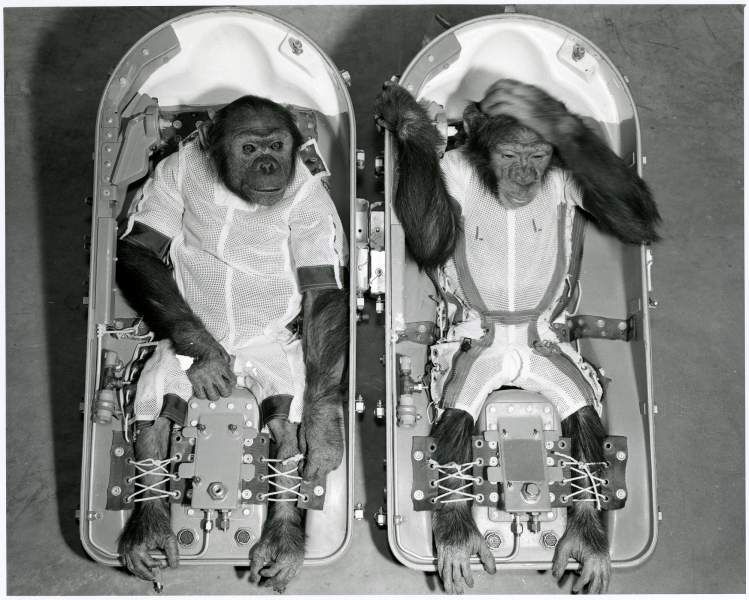
In 1982 the Cold War was raging, and the threat of nuclear war loomed over the world.
Raegen and Thatcher had taken their elected posts, and the rejection of détente in favor of the Reagan Doctrine was in full swing. June 1982 hosted the largest protest in US history, with over one million people marching in NYC against the cold war arms race and nuclear weapons. This over-arching anxiety caused many to assume the end time was near and motivated some to do everything they could to save us all.
“This book is not copyrighted. You are asked to reproduce it in whole or in part, to distribute it with or without charge, in as many languages as possible, to as many people as possible. The rapid alerting of all humankind to nuclear realities is supremely urgent. If we are wiped out by nuclear destruction in the next few years, how important are the things we are doing today?”
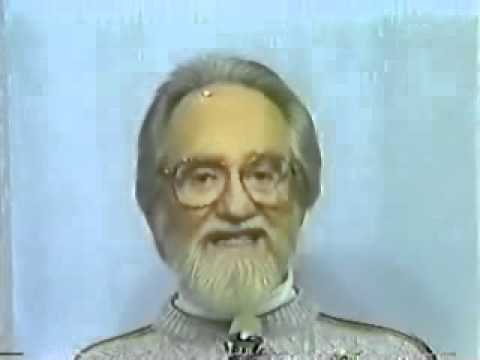
Meet Ken Keyes Jr.
Best known for his work as a personal growth mentor and creator of a self-help system called the Living Love Method. He was an outspoken pacifist and proficient author with 15 titles under his belt and millions of copies sold or distributed.
He was a lecturer, spoke at political gatherings, and knew and moved among the self-help elite. His books are still available today with a small group of his students maintaining ties and carrying on his methods. However, Keyes’ organization essentially died with him in 1995.
No one that ever lived has ever had enough power, prestige, or knowledge to overcome the basic condition of all life – you win some and you lose some.
– Ken Keyes Jr.
Keyes, a man best known for his self-love methods, pulled no punches in his futurism works. He wrote two books on the subject, both warnings of impending doom. But one of these books had an impact no one could have predicted – it may have halted decades of scientific research into animal and evolutionary behaviors.
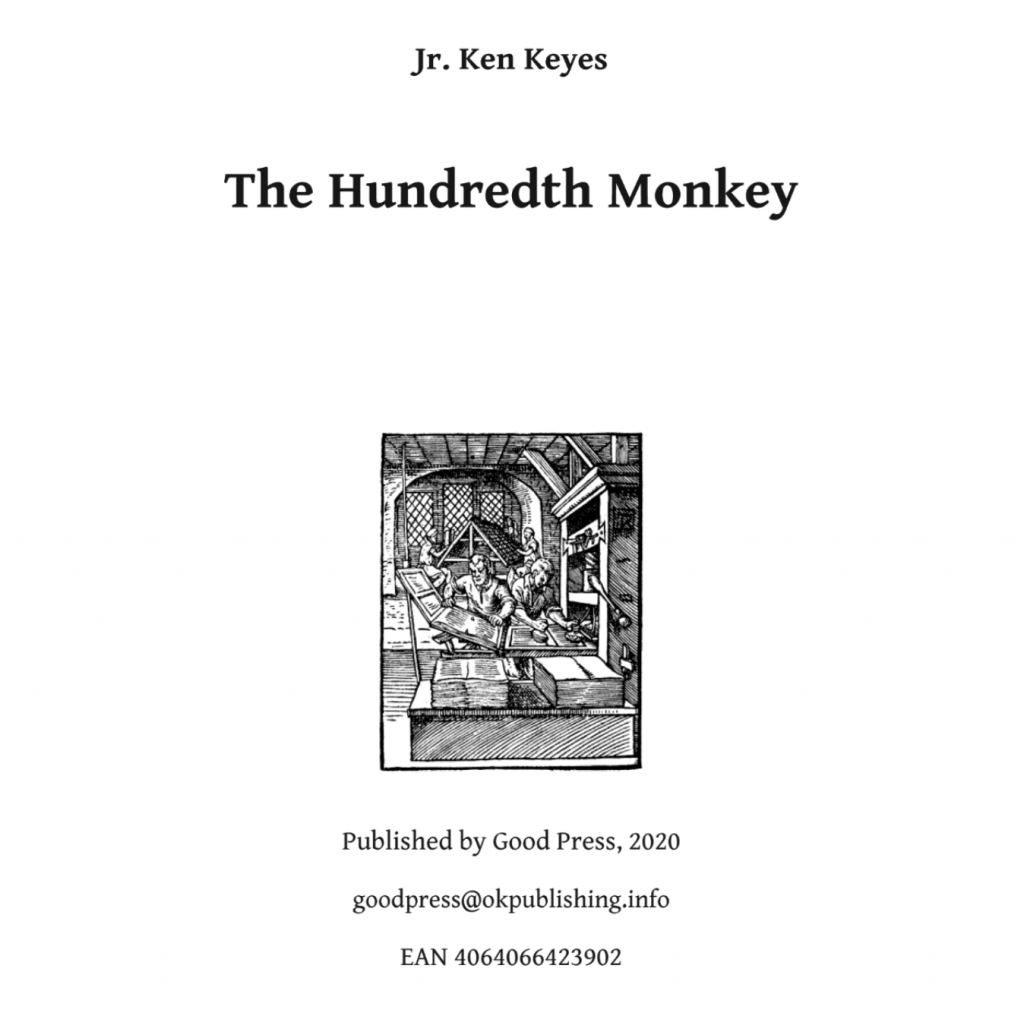
The 100 Monkey Phenomenon
The hundredth monkey phenomenon refers to a sudden spontaneous and mysterious leap of consciousness achieved when an allegedly “critical mass” point is reached.
The Skeptics Dictionary
In the 1950s, a behavioral study was conducted on a troupe of Japanese monkeys on Kōjima island that later created the 100 monkey theory.
While studying the Monkeys, the team would drop sweet potatoes on the beach and observe the troupe’s behavior. In 1954, the team reported the first observances of one monkey washing her sweet potatoes in the water, and her changed behavior led to several more copying her. The scientists believed this was the start of an evolutionary change in the species behavior and were considered to be of great benefit to understanding the process of animal behavior. This small study didn’t make many waves at the time, but two decades later, it would be revived.
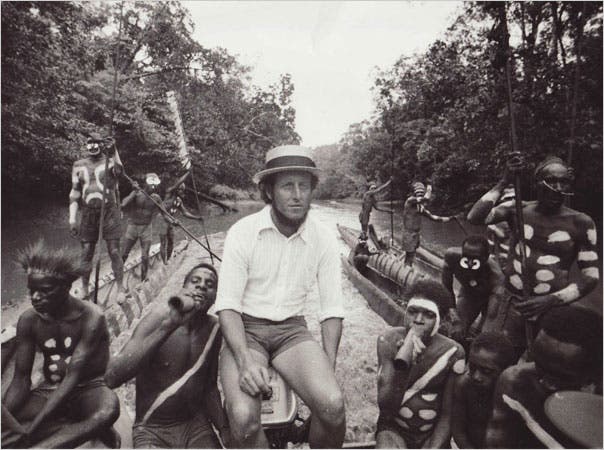
The theory became widespread due to a scientist named Dr. Lyall Watson. While promoting his book Lifetide (1979), Watson alleged that the Japanese scientists were “reluctant to publish [the whole story] for fear of ridicule.” He claimed he had “to gather the rest of the story from personal anecdotes and bits of folklore among primate researchers because most of them are still not quite sure what happened.”2
Photo of Dr. Lyall Watson – New York Times
I am forced to improvise the details, but as near as I can tell, this is what seems to have happened. In the autumn of that year, an unspecified number of monkeys on Koshima were washing sweet potatoes in the sea. . . . Let us say, for argument’s sake, that the number was ninety-nine and that at eleven o’clock on a Tuesday morning, one further convert was added to the fold in the usual way. But the addition of the hundredth monkey apparently carried the number across some sort of threshold, pushing it through a kind of critical mass, because by that evening almost everyone was doing it. Not only that, but the habit seems to have jumped natural barriers and to have appeared spontaneously, like glycerine crystals in sealed laboratory jars, in colonies on other islands and on the mainland in a troop at Takasakiyama.
– Dr. Lyall Watson
I would like to side note here that my Grammar app believes that the tone of this quote sounds “uncertain” with a 5 out of 5 match. Do with this what you will.
So Dr. Watson claimed that one monkey taught another who taught another until every monkey on the island were washing potatoes, including some who had never done it before. This in and of its self isn’t that wild but he theorized that when the 100th monkey learned to wash potatoes, a chain reaction was started and monkeys on other islands with no contact with the original 100 became aware of the behavior and acted accordingly. Monkey telepathy, in so many words.
Today, this theory has been largely debunked but lives on in New Age mythology and urban legend. If you would like to dig in more to Watson, the monkeys, and the researched involved, The Skeptics Dictionary has a create write up you should check out.
So how did this free book and the use of the 100th monkey theory potentially damage scientific research? For this, I’ll let Wikipedia take it away –
Keyes combined two items of truth: that the Koshima monkeys learned to wash sweet potatoes, and that the phenomenon was observed on neighboring islands. He did not provide substantiating evidence for his claims, diluting the importance of both studies and potentially discrediting the scientists involved.
Combining this science with his political views may also have damaged the research credibility, leading to many reporters attempting to ‘debunk’ the Japanese team’s research without doing sufficient research themselves.
Wikipedia – 100th Monkey Theory
Does any of this really matter in regards to the quote on the back of a CD? Not really. I believe it can stand alone without the weird history being known. However, the beauty of the technological world we live in is how one can feed their curiosity, going down any rabbit hole that beckons them. You should try it! Make sure to let me know what you find. I won’t be signing up for any self-love seminars anytime soon but designing a poster around the phrase isn’t out of the question.
And with that, I leave you with this –
“I dedicate this to the dinosaurs, who mutely warn us that a species which cannot adapt to change conditions will become extinct”
Take it in good health.

